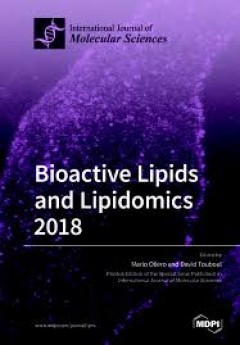Filter by

Bioactive Phytochemicals in Health and Disease
Kurarinone is a prenylated flavonone isolated from the roots of Sophora flavescens. Among its known functions, kurarinone has both anti-apoptotic and anti-inflammatory properties. Coronaviruses (CoVs), including HCoV-OC43, SARS-CoV, MERS-CoV, and SARS-CoV-2, are the causative agents of respiratory virus infections that range in severity from the common cold to severe pneumonia. There are cu…
- Edition
- -
- ISBN/ISSN
- 9783039431380, 9783039431397
- Collation
- 264
- Series Title
- -
- Call Number
- -

Alienation Effects
Exciting new scholarship has been emerging as performance studies scholars begin to turn their attention to the performance of politics, nationhood, and jurisprudence. Branislav Jakovljevic's project on the history and eventual demise of the former Yugoslavia demonstrates how fruitful this approach can be. Jakovljevic considers the concept of theatricality as central to understanding the events…
- Edition
- -
- ISBN/ISSN
- 9780472073146
- Collation
- 370 hlm; ill., lamp.,
- Series Title
- -
- Call Number
- -

Bioactive Natural Products from the Red Sea
Marine natural products have achieved great success as an important source of new lead compounds for drug discovery. The Red Sea provides enormous diversity on the biological scale in all domains of life including micro- and macro-organisms. In this review, which covers the literature to the end of 2019, we summarize the diversity of bioactive secondary metabolites derived from Red Sea micr…
- Edition
- -
- ISBN/ISSN
- 9783036515885, 9783036515878
- Collation
- 152
- Series Title
- -
- Call Number
- -

Bioactive Molecules with Healthy Features to Food and Non-food Applications
The aim of this study, focused on the nutritional value of wild berries, was to determine the contents of macronutrients, profiles of fatty (FAs) and amino acids (AAs), and the contents of selected elements in red arils (RA) of Taxus baccata L., grown in diverse locations in Poland. Protein (1.79–3.80 g/100 g) and carbohydrate (18.43–19.30 g/100 g) contents of RAs were higher than in ma…
- Edition
- -
- ISBN/ISSN
- 9783036514987, 9783036514970
- Collation
- 150
- Series Title
- -
- Call Number
- -

Bioactive Molecules from Marine Microorganisms
Cyanobacteria are a rich source of secondary metabolites with a vast biotechnological potential. These compounds have intrigued the scientific community due their uniqueness and diversity, which is guaranteed by a rich enzymatic apparatus. The ribosomally synthesized and posttranslationally modified peptides (RiPPs) are among the most promising metabolite groups derived from cyanobacteria.
- Edition
- -
- ISBN/ISSN
- 9783036506203, 9783036506210
- Collation
- 172
- Series Title
- -
- Call Number
- -

Bioactive Marine Heterocyclic Compounds
Exploration for specialized metabolites of Okinawan marine sponges Agelas spp. resulted in the isolation of five new bromopyrrole alkaloids, agesasines A (1) and B (2), 9-hydroxydihydrodispacamide (3), 9-hydroxydihydrooroidin (4), and 9E-keramadine (5). Their structures were elucidated on the basis of spectroscopic analyses. Agesasines A (1) and B (2) were assigned as rare bromopyrrole alka…
- Edition
- -
- ISBN/ISSN
- 9783036527529, 9783036527536
- Collation
- 132
- Series Title
- -
- Call Number
- -

Bioactive Lipids and Lipidomics 2018
Cyclooxygenases (COXs), including COX-1 and -2, are enzymes essential for lipid mediator (LMs) syntheses from arachidonic acid (AA), such as prostaglandins (PGs). Furthermore, COXs could interplay with other enzymes such as lipoxygenases (LOXs) and cytochrome P450s (CYPs) to regulate the signaling of LMs
- Edition
- -
- ISBN/ISSN
- 9783039362769, 9783039362776
- Collation
- 296
- Series Title
- -
- Call Number
- -

Bioactive Gel Films and Coatings Applied in Active Food Packaging
The essential oil extracted from Melissa officinalis (MOEO) exhibits a wide range of therapeutic properties, including antioxidant, antibacterial, and antifungal activities. The current research aimed to analyze the mechanical, barrier, chemical, and antioxidant properties of pectin and collagenbased films.
- Edition
- -
- ISBN/ISSN
- 9783036597195, 9783036597188
- Collation
- 180
- Series Title
- -
- Call Number
- -

Bioactive Formulations in Agri-Food-Pharma: Source and Applications, Volume II
One of the major concerns for utilizing ionic liquid on an industrial scale is the cost involved in the production. Despite its proven pretreatment efficiency, expenses involved in its usage hinder its utilization. A better way to tackle this limitation could be overcome by studying the recyclability of ionic liquid.
- Edition
- -
- ISBN/ISSN
- 9783036567211, 9783036567204
- Collation
- 244
- Series Title
- -
- Call Number
- -

Bioactive Food Peptides in Health and Disease
provides a general overview of foodderived peptides for the promotion of human health and the prevention/management of chronic diseases. The book provides updated and interesting information on bioactive peptides obtained from both animal and plant food sources, emphasizing on important aspects related to their bioactivity, mechanism of action, and bioavailability
- Edition
- -
- ISBN/ISSN
- 9789535109648, 9789535153511
- Collation
- 278
- Series Title
- -
- Call Number
- -
 Computer Science, Information & General Works
Computer Science, Information & General Works  Philosophy & Psychology
Philosophy & Psychology  Religion
Religion  Social Sciences
Social Sciences  Language
Language  Pure Science
Pure Science  Applied Sciences
Applied Sciences  Art & Recreation
Art & Recreation  Literature
Literature  History & Geography
History & Geography